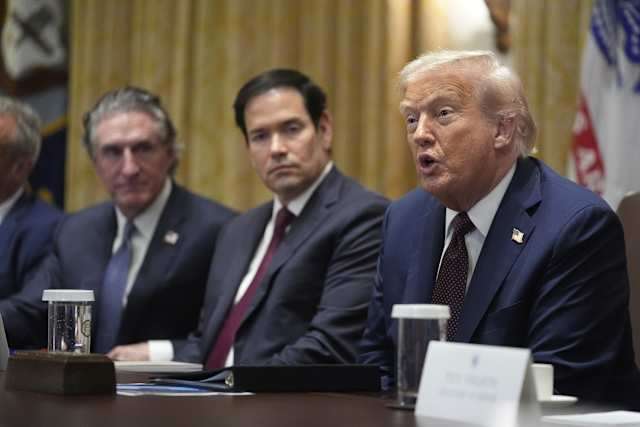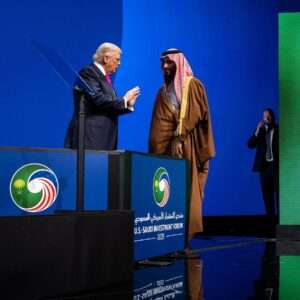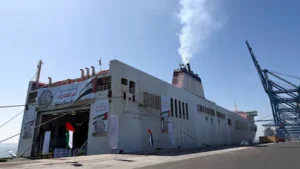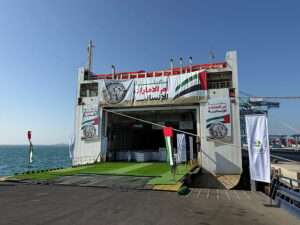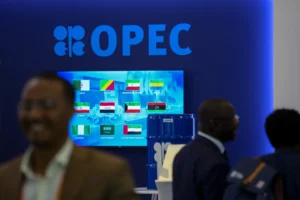In a dramatic escalation of Middle East tensions, President Donald Trump has demanded that Israeli Prime Minister Benjamin Netanyahu commit to no further strikes on Qatar following an unannounced Israeli attack targeting Hamas leaders in Doha, according to Axios, citing two sources familiar with the matter. The strike, which killed five Hamas operatives and a Qatari security official, has sparked outrage in the White House, strained U.S.-Israel relations, and sent shockwaves through regional and global leaders. The incident, launched without prior consultation with Trump or his top advisers, has underscored the delicate balance of power and diplomacy in the region, particularly given Qatar’s role as a key mediator and host to the U.S. military’s Al Udeid Air Base.
The Israeli operation in Doha last Tuesday targeted senior Hamas figures gathered to discuss a U.S.-backed ceasefire proposal but failed to eliminate the group’s top leaders, according to Israeli officials. Netanyahu informed U.S. officials only after missiles were in the air, a move that infuriated the Trump administration and raised concerns about diplomatic fallout. The attack has drawn sharp condemnation from U.S. allies like Qatar, Saudi Arabia, and the United Arab Emirates, derailing efforts to secure a truce and release the 48 hostages still held by Hamas in Gaza. Qatar, a major non-NATO U.S. ally, has long served as a hub for diplomatic negotiations, including hosting Hamas political leaders as part of its mediation in the Israeli-Palestinian conflict. The strike risks destabilizing these efforts and complicating U.S. foreign policy objectives as the Trump administration navigates its Middle East peace strategy.
Trump’s demand for a no-strike pledge reflects his desire to maintain regional stability while asserting influence over Israel, a close ally. The White House has not publicly detailed its response, but the reported demand signals an effort to rein in Israel’s military actions in neutral or allied territories. Trump publicly distanced himself from the operation, stating it “does not advance Israel or America’s goals” and assuring Qatar that such incidents would not recur. The U.S. even joined a U.N. Security Council statement condemning the strike without naming Israel, highlighting the administration’s delicate balancing act. Regional leaders are closely watching how this episode will affect U.S.-Israel relations and Qatar’s mediation role, with an emergency Arab-Islamic summit slated for Monday in Doha to denounce the attack.
Amid this fallout, U.S. Secretary of State Marco Rubio arrived in Israel on Sunday for high-stakes meetings with Netanyahu, Foreign Minister Gideon Sa’ar, and families of the hostages, many of whom oppose Israel’s plans for a major offensive in Gaza City. Rubio’s two-day visit aims to navigate the diplomatic crisis and chart a path to end the nearly two-year Gaza war, now approaching its second anniversary since Hamas’s October 7, 2023, attack on Israel. The conflict has resulted in over 64,000 Palestinian deaths, according to regional reports, amid accusations of genocide from international experts. Israel’s recent strikes, which killed at least 11 more people in Gaza since Sunday, and its demolition of high-rise buildings it claims house Hamas infrastructure, have exacerbated the humanitarian toll.
Speaking to reporters before departing Washington on Saturday, Rubio acknowledged Trump’s dissatisfaction with the Doha strike but emphasized the enduring U.S.-Israel alliance. “Obviously we’re not happy about it. The president was not happy about it,” Rubio said. “Now we need to move forward and figure out what comes next.” His agenda includes pressing Israel on its “operational goals” in Gaza, the impact of the Qatar strike on ceasefire prospects, and broader regional security issues, including countering international moves toward recognizing a Palestinian state ahead of next week’s U.N. General Assembly. Rubio also plans to visit the City of David archaeological site in east Jerusalem, a contested area symbolizing the Israeli-Palestinian divide, in a nod to the humanitarian crisis.
The Trump administration is treading a fine line between supporting Israel and maintaining ties with Qatar. On Friday, Rubio and Vice President JD Vance hosted Qatari Prime Minister Sheikh Mohammed bin Abdulrahman Al Thani at the White House to address the strike’s repercussions. Later that evening, Trump and special envoy Steve Witkoff dined with the sheikh in New York during 9/11 commemorations. Qatar’s leaders have vowed to continue their mediation role, but Sheikh Mohammed told CNN the strike has “killed any hope” for immediate hostage releases. Netanyahu, however, defended the operation as necessary to eliminate Hamas threats, suggesting it could hasten the war’s end.
Rubio’s visit also touches on Israel’s expanding West Bank settlements and defenses against International Criminal Court actions targeting Netanyahu. European nations, including London, Paris, and Berlin, have called for halting the Gaza offensive and are inching toward Palestinian state recognition, a move Rubio aims to counter. “Hamas is no longer a threat, so we can move on to the next phase,” Rubio said, outlining Trump’s vision for a resolution that includes defeating Hamas, repatriating all hostages—including the deceased—and rebuilding Gaza without the group’s influence. Key questions remain: Who will oversee Gaza’s reconstruction? Who will fund it? And how to ensure Hamas’s permanent exclusion?
Despite the tensions, Rubio’s trip signals unwavering U.S. support for Israel, which faces growing isolation. “This is an emergency tour designed to show some kind of solidarity after the Doha strikes,” said Aaron David Miller, a former U.S. Middle East negotiator. The State Department affirmed Rubio’s mission to “reaffirm the U.S. commitment to Israeli security” while prioritizing shared goals like hostage returns and preventing Hamas’s resurgence. With the U.N. General Assembly looming and regional fissures widening, Rubio’s discussions in Jerusalem may determine whether Trump’s Middle East peace ambitions—once a hallmark of his first term—can be salvaged from the brink.

